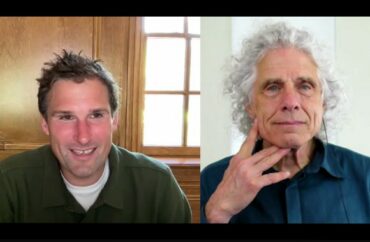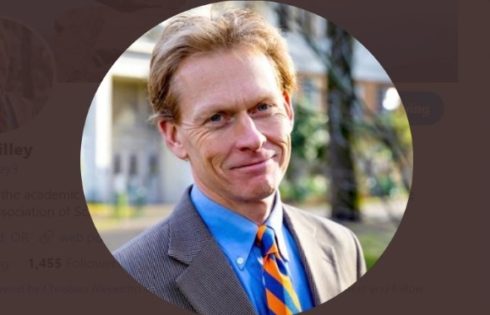
If Harvard wants to keep credibility, professor and alumni group say it must fix problems with DEI, antisemitism
Harvard University certainly has “serious” problems, but the Trump administration – with its “clear authoritarian tendencies” – has gone too far by stripping its federal funding and ability to enroll international students.
That was the gist of the comments by psychology Professor Steven Pinker (pictured right) and alumnus Sam Lessin (pictured left) during an online “fireside chat” about Harvard’s woes on Friday afternoon.
During the event hosted by the alumni group 1636 Forum, Pinker and Lessin discussed the Trump administration’s recent actions against the school, Harvard’s problems, and their ideas about ways to enact internal reform.
They also discussed how much of higher education as a whole has strayed from its fundamental purpose: “to pursue and transmit knowledge” — and how that is “incompatible” with social justice.
Unlike some faculty, Pinker said he believes Harvard does have big problems with diversity, equity, and inclusion, antisemitism, and viewpoint diversity. The renowned psychologist has called out the university for its faults for years, including in a recent op-ed in the New York Times.
Pinker wrote in late May about Harvard’s “serious aliments” and need for reform. However, he also asserted that the Trump administration has gone too far in its “all-out assault” on the institution’s funding and reputation.
Speaking with Lessin, Pinker said the “completely hyperbolic denunciation of Harvard” is “out of touch with reality,” and the Republican leader’s actions could cause the institution to bleed out, rather than reform.
For example, in May, the Department of Homeland Security revoked Harvard’s certification allowing it to enroll international students, putting students who are currently here in jeopardy, Pinker said.
A judge quickly blocked the action after Harvard sued. It’s one of two lawsuits the Ivy League school has filed against the Trump administration in recent months in an on-going dispute over antisemitism and DEI.
Lessin compared the conservative outrage about Harvard to a meme, saying the popular message right now is that the institution is “all bad and must be crushed by any means possible.” The reality, he said, is more nuanced.
The administration’s actions, which also include cutting the school’s federal funding, are “not an appropriate remedy,” Pinker said. Leaders should be working to fix Harvard’s problems, not destroy the university, he said.
He also described the administration as having “clear authoritarian tendencies.”
At the same time, if Harvard wants to maintain its reputation and credibility, it must commit to fixing its real problems, Pinker and Lessin agreed.
One problem is the lack of viewpoint diversity. The number of conservatives on faculty is “too low” and the “woke” too high, Pinker said.
Pinker said he also has observed that “social justice” faculty in the English, history and African American studies departments are the ones who speak up the most at faculty meetings.
“Scientists kind of want to be left alone and to stay in their labs, so you get disproportionate representation whenever there’s a vote,” he said.
What’s more, people with a “social justice” orientation tend to be the ones who become university administrators, he said.
For too long, Pinker said many higher education institutions have failed to articulate and enforce their key principle: “veritas,” or the “pursuit of truth.”
Lessin agreed, noting that the Council on Academic Freedom at Harvard has been trying to address the problem for a while by advocating for academic freedom and diversity of thought.
Pinker said the council, which he helped to create, has become more important than he anticipated. It began in response to “cancel culture,” including when former Harvard biology Professor Carole Hooven was demonized for saying sex is binary, he said.
Seeing Hooven get no support from administration was the “last straw” for Pinker.
But the problem also extends beyond Harvard. Universities — and many in society — seem to have lost sight of the purpose of higher education, Pinker said.
Even some faculty now believe their mission is to pursue social justice, and some universities have incorporated it into their mission statements, he said.
“I know that for a fact because the New York Times fact checkers would not let me say, ‘The mission of the university is to pursue and transmit knowledge.’ They say, well that’s not true of all universities even by their own mission statements,” Pinker said.
“I think that’s wrong for a number of reasons, one is we don’t have the expertise, we universities; society didn’t give us that mandate. It’s just arrogant and it is bound to alienate the population, and it’s inappropriate … The university can’t pursue it if reasonable people disagree as to what it is,” he said.
Pinker said he believes that “social justice and pursuing truth” are “incompatible,” and Lessin said faculty who disagree should probably leave the institution.
As to reforms, Pinker said he does believe Harvard is capable of changing internally. However, it must adopt a “robust” commitment to academic freedom and give more attention to viewpoint diversity, he said.
Another area of reform would be to adopt clear guidelines for protests and to apply disciplinary actions consistently, he said. Pinker said he also would “disempower” DEI without eliminating it entirely.
MORE: Trump says he’ll follow through on ending Harvard’s tax-exempt status
IMAGE CAPTION AND CREDIT: Professor Steven Pinker and alumnus Sam Lessin discuss the need for reforms at Harvard University; 1636 Forum
Like The College Fix on Facebook / Follow us on Twitter






Please join the conversation about our stories on Facebook, Twitter, Instagram, Reddit, MeWe, Rumble, Gab, Minds and Gettr.